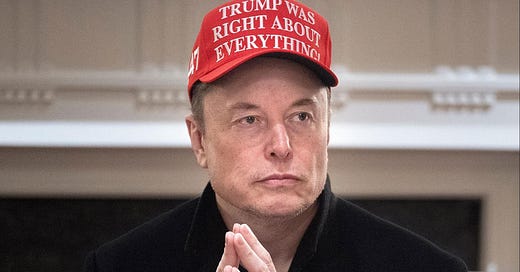The Price Of The Bench
What happens when a Supreme Court seat collides with Elon Musk’s money—and Donald Trump’s agenda?
There are moments in the life of a nation—quiet, almost decorous—when it is forced to ask itself a question it’s been avoiding:
What are we willing to sell?
Wisconsin is asking that question now
.
We’ll get the answer this coming Tuesday, April 1, when voters there cast their ballots for state Supreme Court justice.
Judge Susan Crawford is running for that seat. She is not promising a revolution. She is not running on outrage. She is not calling for war. She is, rather inconveniently for some, calling for the law to remain what it was intended to be: a safeguard, not a weapon.
And for that—for her steadiness, for her refusal to play the game—she has attracted the attention of the richest man on the planet—and arguably, one of its most influential.
Elon Musk is not running in Wisconsin. He is not voting in Wisconsin. But he is spending in Wisconsin—freely, strategically, and at a scale that would make even seasoned political donors blink.
We are told this is democracy in action. We are told that everyone has a right to participate. But participation backed by billions is not quite the same thing as civic engagement. It is something else entirely. Something quieter. Sharper. More difficult to name.
This is not about Musk’s character. It is about his reach. About what it means when a person who shapes technology, speech, and markets begins to invest—quite literally—in the composition of a court.
Just a year ago, I interviewed Elon Musk. In that conversation, he stated clearly that he didn’t want to influence an election. That he probably wouldn’t donate to campaigns or candidates. That putting his thumb on the scale was something he wanted to avoid. And at the time, I believed he meant it.
But ambition has a way of evolving.
In the last election cycle, Musk became the largest political donor in the country—contributing over $291 million, the vast majority of it backing Republicans. He also funneled $20.5 million into efforts supporting Judge Brad Schimel—$3 million routed through the state GOP, and another $17.5 million spent by super PACs aligned with him. These are not whispers of influence. These are declarations.
Tesla is suing the state of Wisconsin. The case involves a direct challenge to state law. And it may, in time, land before the very court Musk is now helping to reshape. That fact is not scandalous. It is, in fact, perfectly legal.
And that is precisely the problem.
We are not witnessing corruption in the old, obvious sense. We are witnessing something more refined: the slow conversion of public institutions into private instruments. It doesn’t happen through backroom deals. It happens through ad buys, endorsements, and a polite insistence that money and merit are somehow the same thing.
But even that line seems to be shifting.
In recent days, Musk announced he would give $1 million checks to two Wisconsin voters who participate in the election. The state’s attorney general challenged the legality of the move, calling it a violation of election law. But a Wisconsin appeals court declined to block the initiative, allowing it to go forward while the legal case plays out.
This is not about generosity. It is about precedent. About how far the line can be stretched before it snaps.
What happens when elections begin to resemble sweepstakes?
What happens when civic participation becomes a lottery?
Behind it all, as ever, stands Donald Trump.
His support for Crawford’s opponent, Judge Brad Schimel, is not subtle. Schimel is a staunch conservative with a long record of siding with restrictive abortion laws, expanding executive power, and limiting labor protections. He represents a vision of the judiciary as an arm of ideological enforcement—not a check on it. With Schimel on the court, Trump and his allies would have not just a vote, but a voice in some of the most consequential rulings of the next decade.
The truth is this: power no longer knocks. It does not seek permission. It moves quietly, strategically, and with the confidence of knowing that most people are too tired or too distracted to resist.
But Susan Crawford is resisting.
She is not loud. She is not radical. What she is—perhaps most dangerously to those who see the law as a tool—is unbought.
And that, in this moment, is its own kind of revolution.
If she wins—if she wins—then we will have to admit what we’ve spent so long denying:
That justice, real justice, does not live in money or machines.
It lives in the quiet refusal.
In the woman who says no.
In the people who say, not this time.




Good morning!! 🍋🍋🍋🍋
Don love to see you getting your writing on man!